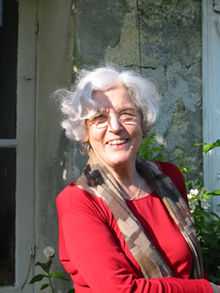Betsy Jolas

Betsy Jolas (born 5 August 1926) is a French composer and a foremost composer of her nation since World War II, although the reach of her music is international. Her music is often intense in its lyricism and nearly always referential of poetry and feeling. It eschews both serialism in its pre-war forms but includes musical sets and tonal analogues. Because it is not historicist, the music does not align with much post-modernism but instead finds wholly individual impetus.
In more recent years she has taught at the Tanglewood Music Festival in Massachusetts and Mills College in California, occupying as a guest professor the Chair of her former teacher Darius Milhaud. She sang and played with the Dessoff Choirs. In 1995 she advanced in the Faculty of the Conservatoire and was named Chair of Analysis, and in 1978 succeeded Messiaen as professor of composition.[citation needed]
Style
In her Plupart du temps II (1989) she creates a dialogue of voice, tenor saxophone, and violoncello. Already she had been moved from sources as varied as Musorgsky in Boris Godunov, Lassus, and Delibes in the “Bell Song” from Lakmé, but also Debussy in Pelléas et Mélisande has suggested a prosody that reframes the pulse, whereby she alters the tempo of the beat places notes in unsuspected groupings within the beat, creating her characteristic wave rhythm.
Composition overview
Since about 1990 she has increasingly turned to chamber music as in Quatuor V (1995), that for solo instruments as Come follow for viola (2001), and aesthetically if not literally historicizing works such as Jean Sébastien Bach-Contrapunctus IV for orchestra (2001, chamber orchestra and vocal quartet).
Honors
- Grand prix national de la musique, 1974
- Grand prix de la ville de Paris, 1981
- Grand prix de la SACEM, 1982
- Commandeur des Arts et des Lettres, 1985
- Prix international Maurice Ravel, 1992
- Chevalier de la Légion d'honneur, 1997
- Berlin Prize, 2000
Bibliography
- CC1 (V. Perlis)
- B. Jolas: ‘Il fallait voter sériel même si…’, Preuves, no.178 (1965), 40–42
- M.J. Chauvin: ‘Entretien avec Betsy Jolas’, Courrier musical de France, no.27 (1969), 163–73
- B. Jolas: ‘Voix et musique’, Bulletin de la Société française de philosophie, lxvi/2 (1972) [entire issue]
- I. Krastewa: ‘Betsy Jolas’, SMz, cxiv (1974), 342–9
- D. Henahan: ‘Betsy Jolas Winning Recognition in the USA’, New York Times (30 Aug 1976)
- J.W. LePage: ‘Betsy Jolas’, Women Composers, Conductors, and Musicians of the Twentieth Century, i (Metuchen, NJ, 1981), 103–15
- B. Massin: ‘Betsy Jolas: Roland de Lassus me fascine’, Panorama-musiques, no.41 (1981) [interview]
- ‘Voir la musique’, L'âne, no.10 (1983) [interview]
- J.-P. Derrien, ed.: 20ème siècle: images de la musique française (Paris, 1985), 143–5 [interview]
- J. Briscoe: ‘Betsy Jolas: Plupart du Temps II’, Contemporary Anthology of Music by Women (Bloomington and Indianapolis,1997)
- V. Perlis: ‘Recordings in Review: Betsy Jolas’, Yale Review (1995), 179–85
- B. Jolas: Molto espressivo (Paris, 1999) [collected writings]
- Kennedy, Michael (2006), The Oxford Dictionary of Music, 985 pages, ISBN 0-19-861459-4
- Thurlow, Jeremy (2001). "Jolas, Betsy". The New Grove Dictionary of Music and Musicians, second edition, edited by Stanley Sadie and John Tyrrell. London: Macmillan Publishers.
- J. Briscoe (2011/2012) "Jolas, Betsy". Grove Dictionary of American Music, 2nd ed. 2012. Oxford Music Online.
External links
- Excerpts from sound archives of Jolas's works.
- Betsy Jolas interview by Bruce Duffie, July 17, 1991
- (French) A biography of Betsy Jolas, from IRCAM's website.
|